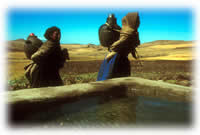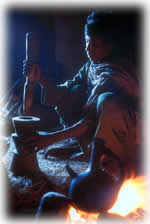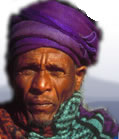RELATED THEMES
education
family life
social institutions
OTHER LOCAL THEMES
agriculture
communications
culture and customs
development
economics
environment
food security
health
history
identity
justice and crime
land
livestock
migration
population
resettlement
social relationships
spiritual beliefs
traditional skills
BACKGROUND
introducing the area
|
gender
 quotes about gender quotes about gender
 key testimonies featuring gender key testimonies featuring gender
 Gender relations seem to have generally changed for the better. Several narrators refer to women now having an equal status with men and no longer being expected to perform tasks such as washing their husbands' feet, although the practice remains in some households. Women are also no longer confined solely to the domestic sphere; technological improvements have reduced their work burden somewhat and they are now more able to take part in meetings and contribute to development activities. However, it is noticeable that it is the male narrators who are inclined to talk in sweeping terms of there now being complete equality between the sexes, as if nothing further remains to be achieved in this sphere. It is clear that conventional attitudes, even among the younger narrators, have by no means disappeared: whereas some are strong advocates of education for both sexes, others are anxious about letting their daughters go to schools outside the local community in case they make independent choices of marriage partner or have sexual relations and become pregnant. Gender relations seem to have generally changed for the better. Several narrators refer to women now having an equal status with men and no longer being expected to perform tasks such as washing their husbands' feet, although the practice remains in some households. Women are also no longer confined solely to the domestic sphere; technological improvements have reduced their work burden somewhat and they are now more able to take part in meetings and contribute to development activities. However, it is noticeable that it is the male narrators who are inclined to talk in sweeping terms of there now being complete equality between the sexes, as if nothing further remains to be achieved in this sphere. It is clear that conventional attitudes, even among the younger narrators, have by no means disappeared: whereas some are strong advocates of education for both sexes, others are anxious about letting their daughters go to schools outside the local community in case they make independent choices of marriage partner or have sexual relations and become pregnant.
quotes about gender
 "In the old days we [women] were limited to the kitchen and never dared to leave the house. We spent the whole day grinding grain and doing other house chores. When our husbands came home they demanded that we wash their feet regardless of whether we were busy. We women were oppressed then. With the Derg (military regime 1974-89) came literacy schools, and a few women who got education left the place to find a job. The rest of us were envious of them and began to attend school. Our men too wanted to be educated. They didn't want to be left behind their women and to sign with their thumbs. In the past the women's burden at home was great. Now education has made life better for mothers and children and I am happy for this even though I have no children." "In the old days we [women] were limited to the kitchen and never dared to leave the house. We spent the whole day grinding grain and doing other house chores. When our husbands came home they demanded that we wash their feet regardless of whether we were busy. We women were oppressed then. With the Derg (military regime 1974-89) came literacy schools, and a few women who got education left the place to find a job. The rest of us were envious of them and began to attend school. Our men too wanted to be educated. They didn't want to be left behind their women and to sign with their thumbs. In the past the women's burden at home was great. Now education has made life better for mothers and children and I am happy for this even though I have no children."
Azenu, F/45, farmer/female head of household, Ethiopia 11
"In the old days women used to be regarded as equal to men because they fought against foreign invaders together with the men. Some men regard women as inferior to men both physically and mentally, but now the women have proved themselves to be equally productive in work and as educated as men. Women have now shown a rapid progress as they have benefited from science and modern education. They can support themselves and their country and they can make contributions within and outside their households."
Muliye, M/37, farmer, Ethiopia 15
"Currently the men are being oppressed. There are more women now and the men are suffering."
Mekonen, M/72, priest, Ethiopia 16
|



 Gender relations seem to have generally changed for the better. Several narrators refer to women now having an equal status with men and no longer being expected to perform tasks such as washing their husbands' feet, although the practice remains in some households. Women are also no longer confined solely to the domestic sphere; technological improvements have reduced their work burden somewhat and they are now more able to take part in meetings and contribute to development activities. However, it is noticeable that it is the male narrators who are inclined to talk in sweeping terms of there now being complete equality between the sexes, as if nothing further remains to be achieved in this sphere. It is clear that conventional attitudes, even among the younger narrators, have by no means disappeared: whereas some are strong advocates of education for both sexes, others are anxious about letting their daughters go to schools outside the local community in case they make independent choices of marriage partner or have sexual relations and become pregnant.
Gender relations seem to have generally changed for the better. Several narrators refer to women now having an equal status with men and no longer being expected to perform tasks such as washing their husbands' feet, although the practice remains in some households. Women are also no longer confined solely to the domestic sphere; technological improvements have reduced their work burden somewhat and they are now more able to take part in meetings and contribute to development activities. However, it is noticeable that it is the male narrators who are inclined to talk in sweeping terms of there now being complete equality between the sexes, as if nothing further remains to be achieved in this sphere. It is clear that conventional attitudes, even among the younger narrators, have by no means disappeared: whereas some are strong advocates of education for both sexes, others are anxious about letting their daughters go to schools outside the local community in case they make independent choices of marriage partner or have sexual relations and become pregnant. 